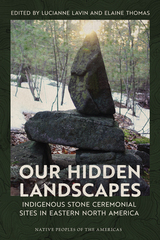5 books about Schott, Nils F.

André Leroi-Gourhan on Technology
A Selection of Writings from the 1930s to the 1960s
André Leroi-Gourhan
Bard Graduate Center, 2023
A selection of Leroi-Gourhan’s most important texts—many translated into English for the first time.
André Leroi-Gourhan is undoubtedly one of the most acclaimed figures of twentieth-century anthropology and archaeology. In France, his intellectual importance rivals that of the Claude Lévi-Strauss, yet Leroi-Gourhan’s major contributions are almost entirely unknown in the Anglophone world. This collection seeks to change that. This selection highlights some of his chief influences, such as elaborating a theory of technology, which argues that material culture focuses on the object in use and how use is a dynamic feature that has specific consequences for human evolution and human society. With serious ramifications for our understanding of material culture, putting Leroi-Gourhan’s thinking about technology into English will have an immediate and transformative impact on material culture studies.
André Leroi-Gourhan is undoubtedly one of the most acclaimed figures of twentieth-century anthropology and archaeology. In France, his intellectual importance rivals that of the Claude Lévi-Strauss, yet Leroi-Gourhan’s major contributions are almost entirely unknown in the Anglophone world. This collection seeks to change that. This selection highlights some of his chief influences, such as elaborating a theory of technology, which argues that material culture focuses on the object in use and how use is a dynamic feature that has specific consequences for human evolution and human society. With serious ramifications for our understanding of material culture, putting Leroi-Gourhan’s thinking about technology into English will have an immediate and transformative impact on material culture studies.
[more]
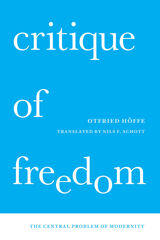
Critique of Freedom
The Central Problem of Modernity
Otfried Höffe
University of Chicago Press, 2020
In this ambitious book, philosopher Otfried Höffe provides a sophisticated account of the principle of freedom and its role in the project of modernity. Höffe addresses a set of complex questions concerning the possibility of political justice and equity in the modern world, the destruction of nature, the dissolving of social cohesion, and the deregulation of uncontrollable markets. Through these considerations, he shows how the idea of freedom is central to modernity, and he assesses freedom’s influence in a number of cultural dimensions, including the natural, economic and social, artistic and scientific, political, ethical, and personal-metaphysical.
Neither rejecting nor defending freedom and modernity, he instead explores both from a Kantian point of view, looking closely at the facets of freedom’s role and the fundamental position it has taken at the heart of modern life. Expanding beyond traditional philosophy, Critique of Freedom develops the building blocks of a critical theory of technology, environmental protection, economics, politics, medicine, and education. With a sophisticated yet straightforward style, Höffe draws on a range of disciplines in order to clearly distinguish and appreciate the many meanings of freedom and the indispensable role they play in liberal society.
Neither rejecting nor defending freedom and modernity, he instead explores both from a Kantian point of view, looking closely at the facets of freedom’s role and the fundamental position it has taken at the heart of modern life. Expanding beyond traditional philosophy, Critique of Freedom develops the building blocks of a critical theory of technology, environmental protection, economics, politics, medicine, and education. With a sophisticated yet straightforward style, Höffe draws on a range of disciplines in order to clearly distinguish and appreciate the many meanings of freedom and the indispensable role they play in liberal society.
[more]
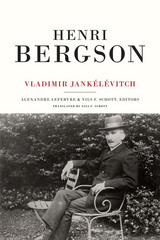
Henri Bergson
Vladimir Jankélévitch
Duke University Press, 2015
Appearing here in English for the first time, Vladimir Jankélévitch's Henri Bergson is one of the two great commentaries written on Henri Bergson. Gilles Deleuze's Bergsonism renewed interest in the great French philosopher but failed to consider Bergson's experiential and religious perspectives. Here Jankélévitch covers all aspects of Bergson's thought, emphasizing the concepts of time and duration, memory, evolution, simplicity, love, and joy. A friend of Bergson's, Jankélévitch first published this book in 1931 and revised it in 1959 to treat Bergson's later works. This unabridged translation of the 1959 edition includes an editor's introduction, which contextualizes and outlines Jankélévitch's reading of Bergson, additional essays on Bergson by Jankélévitch, and Bergson's letters to Jankélévitch.
[more]
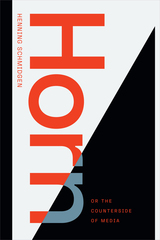
Horn, or The Counterside of Media
Henning Schmidgen
Duke University Press, 2022
We regularly touch and handle media devices. At the same time, media devices such as body scanners, car seat pressure sensors, and smart phones scan and touch us. In Horn, Henning Schmidgen reflects on the bidirectional nature of touch and the ways in which surfaces constitute sites of mediation between interior and exterior. Schmidgen uses the concept of "horn"—whether manifested as a rhinoceros horn or a musical instrument—to stand for both natural substances and artificial objects as spaces of tactility. He enters into creative dialogue with artists, scientists, and philosophers, ranging from Salvador Dalí, William Kentridge, and Rebecca Horn to Sigmund Freud, Walter Benjamin, and Marshall McLuhan, who plumb the complex interplay between tactility and technological and biological surfaces. Whether analyzing how Dalí conceived of images as tactile entities during his “rhinoceros phase” or examining the problem of tactility in Thomas Pynchon’s The Crying of Lot 49, Schmidgen reconfigures understandings of the dynamic phenomena of touch in media.
[more]
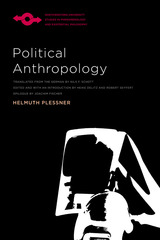
Political Anthropology
Helmuth Plessner, Translated from the German by Nils F. Schott, Edited and with an introduction by Heike Delitz and Robert Seyfert and an epilogue by Joachim Fischer
Northwestern University Press, 2019
In Political Anthropology (originally published in 1931 as Macht und menschliche Natur), Helmuth Plessner considers whether politics—conceived as the struggle for power between groups, nations, and states—belongs to the essence of the human. Building on and complementing ideas from his Levels of the Organic and the Human (1928), Plessner proposes a genealogy of political life and outlines an anthropological foundation of the political. In critical dialogue with thinkers such as Carl Schmitt, Eric Voegelin, and Martin Heidegger, Plessner argues that the political relationships cultures entertain with one other, their struggle for acknowledgement and assertion, are expressions of certain possibilities of the openness and unfathomability of the human.
Translated into English for the first time, and accompanied by an introduction and an epilogue that situate Plessner's thinking both within the context of Weimar-era German political and social thought and within current debates, this succinct book should be of great interest to philosophers, political theorists, and sociologists interested in questions of power and the foundations of the political.
Translated into English for the first time, and accompanied by an introduction and an epilogue that situate Plessner's thinking both within the context of Weimar-era German political and social thought and within current debates, this succinct book should be of great interest to philosophers, political theorists, and sociologists interested in questions of power and the foundations of the political.
[more]
READERS
Browse our collection.
PUBLISHERS
See BiblioVault's publisher services.
STUDENT SERVICES
Files for college accessibility offices.
UChicago Accessibility Resources
home | accessibility | search | about | contact us
BiblioVault ® 2001 - 2025
The University of Chicago Press



